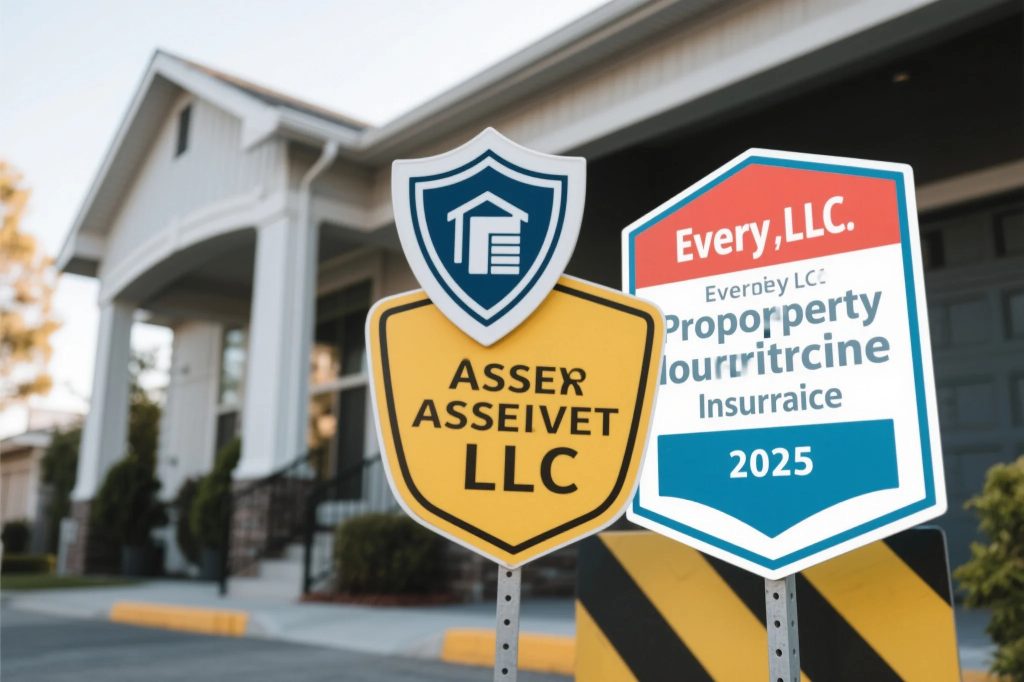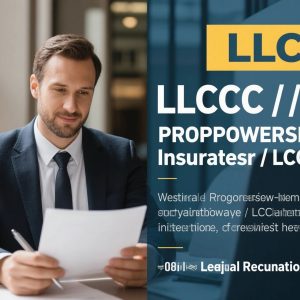The Essential Protection Every LLC Can’t Afford to Ignore
Operating an LLC without proper property liability insurance in 2025 is like driving without brakes – eventually, disaster strikes. While forming an LLC provides personal asset protection, it does nothing to shield your business properties from lawsuits, natural disasters, or accidents that could wipe out years of investment. The modern business landscape presents evolving risks that demand more sophisticated coverage than generic policies from years past. What many LLC owners fail to realize is that standard commercial policies often contain dangerous exclusions for common threats like cyber-physical system failures, climate-related damage, or lawsuits from third parties injured on your property. Your physical locations – whether owned or leased – represent both your most valuable assets and greatest vulnerabilities. Without adequate protection, a single incident could force you to liquidate business properties to cover damages, legal fees, or reconstruction costs. The right coverage does more than satisfy lease requirements or lender mandates; it provides the financial resilience to survive unexpected catastrophes that would otherwise destroy less-prepared competitors.
Understanding Property Liability Fundamentals for LLCs
property liability insurance serves dual critical functions for LLCs by protecting both physical assets and legal exposures. The property component covers damage to buildings, equipment, inventory, and other business properties from covered perils like fire, theft, or severe weather. The liability portion defends against claims alleging your property caused bodily injury or property damage to others – think slip-and-fall accidents or falling debris incidents. For LLCs, this coverage takes on added importance because while the corporate structure shields personal assets, business properties remain completely exposed. Many policies now need endorsements to address contemporary risks like green building code upgrades after partial losses, cyber incidents causing physical damage, or ordinance changes that increase rebuilding costs. Perhaps most critically, LLCs must ensure their coverage amounts reflect current replacement costs rather than original purchase prices, as construction inflation has dramatically increased rebuilding expenses across most markets.
Commercial Property Coverage Tailored to Your Business
Not all commercial building insurance policies provide equal protection, and LLCs need specialized solutions matching their unique risk profiles. Retail operations require different coverage than manufacturing facilities, while home-based businesses have distinct needs from commercial office tenants. The most comprehensive policies go beyond basic structure protection to include business personal property, valuable papers, exterior fixtures, and improvements to leased spaces. Many LLCs benefit from additional endorsements for equipment breakdown, utility interruption, or electronic data loss that standard policies exclude. In today’s climate-volatile environment, flood and windstorm coverage often requires separate purchases even in traditionally low-risk areas. Perhaps most importantly, LLCs must pay special attention to “loss of business income” provisions that help cover ongoing expenses and lost profits during reconstruction periods – a lifeline that prevents temporary closures from becoming permanent ones.
Why LLCs Need Layered Liability Protection
While property liability insurance forms the foundation, savvy LLC owners augment it with umbrella insurance for companies to create comprehensive protection. Standard liability policies often cap out at $1-2 million – amounts that can evaporate quickly in serious injury lawsuits or multi-party property damage claims. Umbrella coverage kicks in when primary limits exhaust, providing additional millions in protection at relatively modest costs. For LLCs, this layered approach is particularly valuable because it preserves both business assets and the corporate veil that protects personal wealth. Many umbrella policies also fill coverage gaps in primary policies, offering protection for claims like false arrest, libel, or slander that standard liability insurance might exclude. As jury awards continue inflating across all industries, having adequate liability limits has transformed from prudent planning to absolute necessity. The most protected LLCs coordinate their umbrella coverage across all policies – general liability, auto, and employers liability – to eliminate dangerous gaps where no coverage applies.
Professional Services Demand Specialized Safeguards
LLCs offering professional services must supplement standard property liability insurance with professional liability insurance to address their unique exposures. Also called errors and omissions (E&O) coverage, this protection defends against claims alleging financial harm from professional mistakes, undelivered services, or negligent advice. While property insurance covers physical assets, professional liability protects the intellectual capital and expertise that service-based LLCs rely upon. Consultants, accountants, architects, and tech professionals particularly need this coverage, though virtually any knowledge worker faces professional liability risks. The policy responds when clients allege your work caused them monetary losses, covering legal defense costs that can exceed six figures even for frivolous claims. Many professional LLCs require specialized endorsements for cyber liability, intellectual property infringement, or regulatory defense costs that standard E&O policies exclude. As professional standards evolve and client expectations rise, maintaining robust professional liability coverage has become non-negotiable for service-based LLCs.

Cost Control Strategies Without Coverage Gaps
Obtaining comprehensive insurance for LLC protection doesn’t require bankrupting your business if you employ smart cost-management strategies. Higher deductibles can substantially reduce premiums for LLCs with sufficient cash reserves to cover the increased out-of-pocket costs when claims occur. Bundling property, liability, and umbrella policies with one carrier often yields package discounts unavailable when purchasing coverages separately. Implementing robust risk management programs – documented safety protocols, security systems, and employee training – can demonstrate reduced risk to underwriters, potentially qualifying for premium credits. For LLCs with multiple properties, blanket coverage that aggregates values across locations sometimes offers better rates than separate policies. Perhaps most importantly, maintaining continuous coverage without lapses prevents insurers from viewing your LLC as higher risk, which can lead to substantially higher premiums when restarting coverage after a gap. Annual policy reviews with independent brokers ensure you’re not overpaying while maintaining adequate protection.
Industry-Specific Considerations for Optimal Protection
The ideal insurance for LLC program varies significantly across industries, demanding tailored solutions rather than one-size-fits-all policies. Restaurant LLCs need special attention to food contamination coverage, grease fire hazards, and liquor liability exposures. Construction LLCs require builders risk policies for projects in progress and completed operations coverage extending long after work finishes. Tech LLCs must ensure their property policies cover specialized equipment and data restoration costs, while professional liability addresses software errors or service interruptions. Retail LLCs should focus on inventory fluctuations, customer injury protections, and product liability considerations. Even home-based LLCs need customized solutions that properly cover business equipment and account for increased liability exposures from client visits. The most effective programs work with brokers who specialize in specific industries, ensuring policy language matches actual operational risks rather than relying on generic forms containing inappropriate exclusions.
Emerging Risks Demanding Policy Updates
The property liability insurance needs of LLCs continue evolving to address novel threats that traditional policies weren’t designed to handle. Climate change has altered weather patterns, increasing risks from floods, wildfires, and severe storms in previously low-risk areas. Cyber-physical system failures now represent a real property threat as hackers target building management systems and industrial controls. The Internet of Things introduces new vulnerabilities where digital attacks can cause tangible property damage. Even traditional coverages need reevaluation – for example, many policies haven’t kept pace with construction cost inflation, leaving LLCs dangerously underinsured. Supply chain disruptions have extended equipment replacement timelines, making business interruption endorsements more valuable. Forward-thinking LLCs conduct annual coverage reviews that account for these emerging risks rather than relying on outdated policies that could prove inadequate when disasters strike.
Legal and Contractual Obligations Impacting Coverage
Maintaining proper commercial building insurance often represents more than just smart business practice – it’s frequently a legal or contractual requirement. Commercial leases almost universally mandate specific liability limits and require landlords to be named as additional insureds. Mortgage lenders impose strict insurance requirements as loan conditions. Government contracts typically specify rigorous coverage standards that bidders must meet. These stipulations aren’t mere formalities – violating them can trigger lease terminations, loan defaults, or contract breaches with severe financial consequences. LLCs operating in regulated industries like healthcare or finance often face additional mandatory coverage requirements. Perhaps most dangerously, inadequate insurance can pierce the corporate veil in lawsuits, exposing members’ personal assets. The most thorough risk management programs include procedures to regularly review and update certificates of insurance, ensuring continuous compliance with all legal and contractual obligations as they evolve.
Claims Scenarios That Test Your Coverage Limits
Understanding how your insurance for LLC would respond to real-world disasters helps identify dangerous gaps before catastrophe strikes. Imagine a burst pipe flooding your office and three neighboring suites – does your policy cover both property damage and the resulting business interruption? Picture a client suffering serious injury from falling signage – would your liability limits withstand a potential seven-figure verdict? Consider a cyberattack disabling your building management systems during extreme weather – are you protected against resulting property damage? These scenarios aren’t hypothetical – they occur daily to LLCs nationwide, often with devastating financial consequences for those with inadequate protection. Stress-testing your insurance program against realistic worst-case scenarios provides the best assurance your coverage will perform when needed most. Many LLCs benefit from formal risk assessments that identify vulnerabilities and quantify potential losses across all operational areas.
Selecting the Right Insurance Partners
Choosing providers for your property liability insurance requires more consideration than just comparing premium quotes. Insurer financial strength ratings indicate the ability to pay claims, particularly important for property coverage where claims might arise years after policy expiration. Claims service reputation determines how smoothly the recovery process will go when disasters strike. Risk control resources offered by carriers can help prevent losses before they occur. Policy flexibility allows for endorsements that address your LLC’s unique operations rather than forcing your business into standardized coverage boxes. Perhaps most importantly, working with brokers who understand your industry and take time to comprehend your specific operations yields better protection than transactional relationships focused solely on price. These partnerships prove invaluable when complex claims arise or when business changes require policy adjustments to maintain adequate protection against evolving risks.
Implementing a Proactive Risk Management Culture
While proper insurance for LLC provides financial protection, the most resilient businesses combine coverage with proactive loss prevention strategies. Documented safety protocols, employee training programs, and regular equipment maintenance all contribute to fewer incidents. Security systems and access controls reduce both property crime risks and liability exposures. Disaster preparedness plans ensure swift responses to minimize damage when incidents occur. Perhaps most importantly, a risk-aware culture where all members understand their role in loss prevention can be more valuable than any single policy. These initiatives not only prevent losses but also demonstrate to insurers that your LLC represents a better risk, potentially qualifying for lower premiums. The most comprehensive programs include regular risk assessments to identify emerging threats before they materialize into claims, allowing for proactive coverage adjustments. This holistic approach provides the stability LLCs need to weather inevitable challenges while pursuing growth opportunities.
Annual Reviews for Ongoing Protection
Treating your commercial building insurance as a static purchase rather than an evolving protection strategy represents one of the most common – and costly – mistakes LLCs make. Annual policy reviews should account for property acquisitions or improvements, changes in operations or services offered, and fluctuations in inventory or equipment values. Legal and regulatory changes may necessitate coverage adjustments to maintain compliance. Market innovations sometimes introduce more efficient ways to structure protection. The most thorough reviews compare current exposures against both existing policies and emerging risks requiring additional safeguards. LLCs experiencing rapid growth may need semi-annual checkups to ensure coverage keeps pace with expansion. These regular evaluations represent the best defense against finding yourself underinsured when disaster strikes. Businesses that treat insurance as a dynamic component of their overall strategy rather than a set-it-and-forget-it expense position themselves to navigate an increasingly complex risk landscape successfully.





